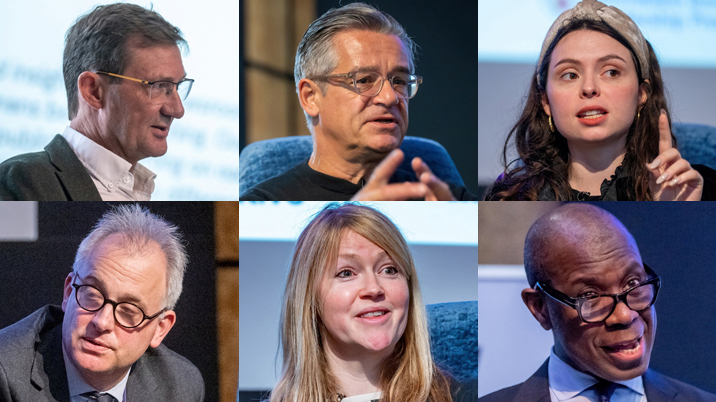
You could be forgiven for being more than a tad pessimistic at the outset of the Society of Editors Media Freedom Conference 2023.
After all, the research from the Reuters Institute for the Study of Journalism representing the views of more than 300 senior media executives across 53 countries which opened the proceedings showed less than half were confident about the year ahead.
Amidst fears of more jobs cuts in uncertain and inflationary times, nineteen per cent were not confident at all and many more executives were described as “distinctly uneasy”.
In fact, the conference was framed by news from Reach, the national and regional publisher, that 200 redundancies were on the way, while News Corp had already announced plans to cut 1,250 posts after missing earnings estimates.
Meanwhile, as the editors met, BBC local journalists had been on a 24-hour strike in protest at job cuts in BBC local broadcasting.
For Nic Newman, senior research fellow at the Reuters Institute, one of the major trends for 2023 involved not just layoffs but also hiring freezes, slimmed down print editions, an end to seven day publication and even the closure of some print editions altogether.
Other trends resulting from pressures on traditional business models would mean increased focus on digital with talk of closure of broadcast channels and attempts to diversify revenues.
There could also be subscription price cuts and special offers with longer trial periods, which might boost revenues in the longer term but reduce current revenues.
Subs growth
Overall, subscription does represent, however, one brighter spark in the outlook with 68 per cent of publishers believing that subscription revenue will continue to rise this year.
As one global subscription publisher put it: “Consumers seek out quality sources when times are tough, even if they retain only one news subscription, we feel they will value what we do and want to stick with us.”
Within subscription, bundling of a diversity of services, along the New York Times model – news, games, cooking, The Athletic and Wirecutter product review website, in this case – is attracting increasing attention.
“Bundled subscribers pay more over time and are less likely to cancel,” according to New York Times chief executive Meredith Kopit Levien.
At least it is not just the traditional media that are facing challenges. The big tech giants of California, for good or ill, are not immune from growing competition either.
Facebook’s reach among the under 25-year-olds fell from 75 per cent in 2017 – to 58 per cent last year while TikTok rose from 1 per cent in 2019 to 40 per cent last year. And that comes before we even consider the self-inflicted chaos inflicted on Twitter by the ownership of Elon Musk.
The changing fortunes among the hi-tech players helps explain why, according to the Reuters research, publishers will be paying less attention to Facebook and Twitter this year – massively so in the case of Facebook – and plan to give greater priority to TikTok as well as podcasts and specialist newsletters.
Blurred lines
Whatever path is chosen towards financial sustainability, one thing is completely clear, according to Professor Charlie Beckett, founding director of Polis, there will be no hard and fast distinctions between different types of media in future.
“It’s going to be multi-format – text, video or audio, it’s all data,” Beckett emphasised.
Alison Phillips, editor-in-chief of The Daily Mirror summed up the challenges facing the future of journalism even more bluntly.
“Money is the big challenge. If we are not getting paid for our journalism, then we have a huge problem. Good journalism is expensive,” Phillips argued.
Money, or more precisely any shortage of it, is pretty basic but new challenges to journalism and publishing seem to be coming in hordes.
They range from Artificial Intelligence (AI) and the likes of ChatGPT, to news fatigue or avoidance of news, or even at its most extreme, a downright distrust, in a sub-Trumpian way, of what the media reports.
Then there are the growing ranks of lawyers whose job it is to keep their clients out of the media and the increasing blurring of the lines between privacy and reputation management in the courts. Deteriorating relationships between the media and the police, and the increasing difficulty of getting any information at all from some police forces across the country, poses yet another challenge.
The decline of local newspapers also poses problems to national newspaper editors such as Ben Taylor of the Sunday Times.
“These papers were our first way into stories and we were able to feed on that,” Taylor conceded.
Not all doom & gloom
Luckily, there are more positive aspects to most of the challenges facing publishers and journalists.
Neither AI nor even ChatGPT is going to sweep away independent journalism. According to Beckett, there is nothing new about the involvement of machines in journalism.
The likelihood is that AI will take over more of the boring routine material while “the human bit” becomes more important.
Taylor also warned that: “we have to find a way of reaching people who are exhausted by the news cycle.”
But the Sunday Times editor insisted that they now knew in very great detail what audiences want – and what they do not want.
Top of the list is explanatory journalism that takes readers behind the scenes and tells them what is really going on.
“They do not want boring interviews with politicians or stories based on press releases. They want insight, analysis and exclusives and frankly that is the only way forward. They don’t stay with political sound bites,” Taylor said.
Sarah Whitehead, deputy head of news-gathering at Sky News explained how Sky tackled the public scepticism about news by inviting viewers into the broadcaster and, on a couple of occasions, streamed question and answer sessions with them.
“We can now use the audience expertise,” said Whitehead.
Charlotte Dewar, chief executive of the Independent Press Standards Organisation (IPSO) argued that journalists were now more accountable than ever before.
“There is a willingness to learn and change and that engagement with critics is not optional,” Dewar warned.
Another positive sign for the media is the continuing spirit of innovation that is inspiring both traditional and newer publishers far beyond the world of print.
Sophia Smith Galer, a senior news reporter at Vice World News told how a lot of her professional energy had been transferred to making TikToks both for Vice and on her own account.
Galer also explained how she was happy to use ChatGPT as a journalistic tool but only as “a prompt” on stories.
Tom Richell, head of multimedia at The Independent whose team is in charge “of everything that moves” at the online publisher, gave evidence of growing ambition on things that move. Richell’s team has just produced their first full-length documentary and plan more and are starting to put people in front of screen to explain stories.
“You can’t do everything but you can get quite close,” Richell said.
Deteriorating police relations
In terms of relations between the media and the police, there is little cause for optimism. With help from lobbying by the Society of Editors, plans to make it mandatory for police to have to record any contacts with journalists alongside terrorists and criminals were overturned.
But latest police advice is that police forces “can” rather than “should” give out names following a charge – which would be a significant move towards secrecy. (The College of Policing has since backed down from this.)
Rebecca Camber, the Daily Mail’s crime and security editor who chairs the Crime Reporters Association, fears the police think they don’t need journalists anymore and use social media instead.
She believes what happened in the case of the missing woman Nicola Bulley should have been a watershed moment and hasn’t been.
“The vacuum left by the police was filled by conspiracy theories and social media. The truth is it is getting worse. With Bulley, at the very least, you need background briefings,” Camber explained.
She was supported by Gabriel Pogrund, Whitehall editor of the Sunday Times and Anthony France, crime correspondent of the Evening Standard who both spoke of extreme difficulties of getting any useful information from the police.
Message from Kyiv
Away from such UK difficulties, there was a sudden intervention that reminded those attending the Media Freedom Conference how important journalism actually is.
Without warning, up popped President Volodymyr Zelenskyy in an exclusive video address in which he praised media coverage of the Russian invasion of the Ukraine for ensuring that “war crimes” would not “pass without trace”.
The Ukrainian president told how more than 15,000 foreign press accreditations had been given so far.
“I am glad that there are many British representatives among them. We opened Ukraine up to the maximum number of eyes for the world to see and for the world to tell the story and for the world to give voice to Ukrainian life,” President Zelenskyy said.
The media had given Ukraine a voice and helped to “give life a chance to win”.
From Ukraine to the work of one of those reporters and presenters who covered the invasion, Clive Myrie, who was awarded the Society’s special fellowship award.
The BBC journalist launched a blistering attack on Rupert Murdoch’s Fox News for the “appalling spectacle” revealed by depositions in the law suit between Dominion Voting Systems and Fox. Fox continued to broadcast “the lie” that Trump’s election had been stolen even though depositions suggest senior executives privately doubted the election fraud story.
In an interview with Society of Editors president, Kamal Ahmed, Myrie said that pressure had increased among younger members of the BBC News team to have an editorial voice.
“Opinions are two-a-penny. Everyone has opinions. What the BBC was founded on was the idea, based on the fact that it gets its money from everybody, you have to try to find that objective truth and cut through all opinions,” Myrie argued.
The BBC presenter explained that two people had inspired him to become a journalist. He saw Alan Whicker travelling to interesting places all over the world and thought he would like to do that. He saw Sir Trevor McDonald, who looked like him, reading the news and thought it might therefore be possible.
But after 35 years as a journalist, Myrie believes it all boils down to a simple mantra.
“All we do is tell stories – stories based on fact,” concluded Clive Myrie.
This article was first published in InPublishing magazine. If you would like to be added to the free mailing list to receive the magazine, please register here.












